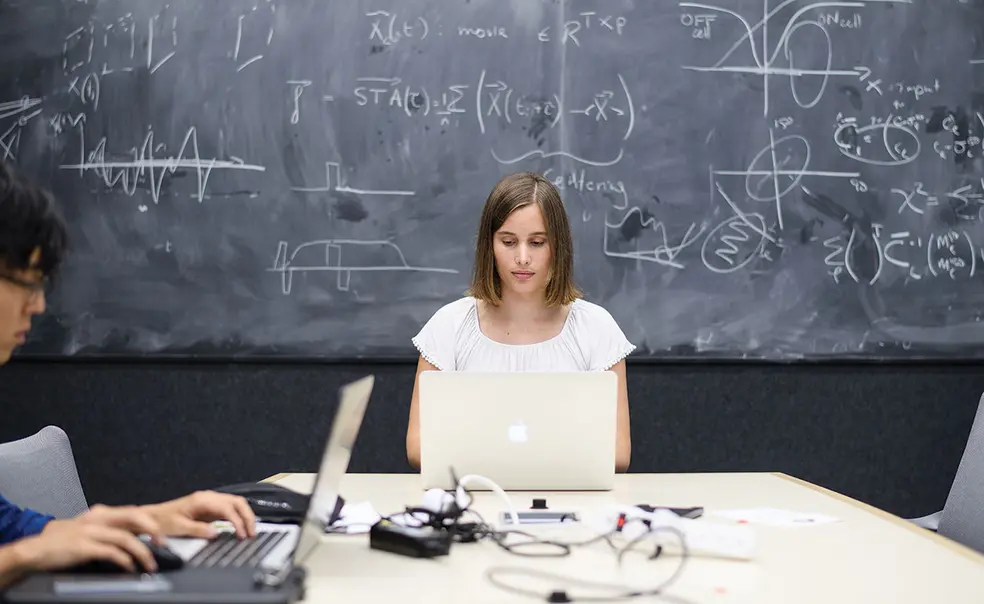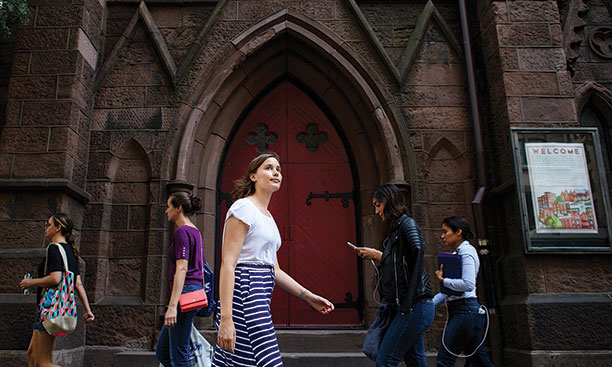This is the first installment of a new feature about a day in the life of a Princetonian.
Heather Prince spends her days immersed in other galaxies. Prince, who is originally from South Africa, is a second-year graduate student in astrophysical sciences. PAW caught up with her on a Tuesday in August while she was participating in a hack week at the Center for Computational Astrophysics in New York City. Prince used the time for collaboration and analysis of telescopic data to look for dusty star-forming galaxies and for active galactic nuclei (“basically a black hole with matter falling into it and these really bright jets”) in microwave maps of the sky. Her day went like this:
Yoga At around 7, I walked down from my hotel on Lexington Avenue to a yoga studio just below Union Square, where I did a Mysore-style Ashtanga class. I do yoga a couple times a week, but I normally do vinyasa flow yoga and some Ashtanga yoga. It keeps me sane. I find that if I don’t get enough exercise, then I’m more stressed and struggle to sleep. Things are much more calm and relaxed when I start the day with yoga.
Breakfast in the city I walked back to the hotel and had some breakfast on the roof with Brittany, another student who’s at the hack week. It was cool — you could see skyscrapers, and the crowds were building in the distance. I had a croissant and some Earl Grey tea. I’m definitely a tea person, not a coffee person.
Hack week Around 10, I went to the Center for Computational Astrophysics. We all were working in a conference room together for the hack week. A lot of what we do is coding because you get a huge amount of data from a telescope, and you can’t just look at it with your eyes and process it with your brain; you have to write decent code that does all the data processing. The telescope that the collaboration works on is Atacama Cosmology Telescope, which looks at microwave data, and the more recent pieces of data have looked at really large areas of the sky, so they’re going to be huge maps that we’ll have to process.
There are people with different focuses at the hack week, but we’re all working on the same data so that often, if you have a question, someone can answer it. It’s a mix of local people and people from far away, mostly students and postdocs and some faculty members. From Princeton, there have been three students, two postdocs, and a faculty member.
Lectures I went to a talk about statistical techniques that the researchers here use in their analysis. At Princeton, during the semester, there are talks all over the place. Most weeks we have a cosmology lunch and talk on Monday, then a colloquium on Tuesday, then on Wednesdays we have a lunch where there’s a talk and then a discussion. I think the main thing is that you keep learning.
After the hack I put on some good walking shoes and went for a walk downtown to SoHo. I was looking around and taking in the random sounds of the city. I like it in small doses, but I’m from a really small town and if I go for a walk, I find myself with nobody else around — it’s just me and my dog, Shir. She’s a husky, she’s adorable. My husband keeps sending me photos of her. When either one of us is away, we send photos of our dog.
During the walk, I bought a random book from the side of the road. It was Alice’s Adventures in Wonderland, one of the older versions. I like children’s literature — if I’m ever really stressed or it’s late at night and I want to just shut down my brain to go to sleep, then something familiar is a good choice.
Dinner I walked all the way downtown, but then I wanted to get back in time for dinner. It was a little Indian restaurant that was close to our hotel, and I went with Brittany and her sister, who works in the city. I had an onion masala dosa, a kind of pancake with an onion and potato filling. We talked a bit about the annoying process of writing up scientific results, since we’re both doing that at the moment. All of us are always in the process of writing a paper. I just keep thinking of more things that I should do, and it then just keeps on taking longer and longer.
The future I hope that someday I will be really good at analyzing data and comparing it to theory. I think the fact that it’s on such astronomical scales that you’re looking at makes it fun. It’s just beyond what you can imagine, but we can still study them from our tiny little place on Earth, which seems kind of insane.
I want to go into academia, so next I would be a postdoc somewhere and then someday a professor.
Edited and condensed by Anna Mazarakis ’16














1 Response
Timothy Butts *72
8 Years AgoA Grad Student’s Day
Re “A Day With ...” astrophysics graduate student Heather Prince (On the Campus, Sept. 13): Fun to read. Surely different from what I was doing as a grad student!